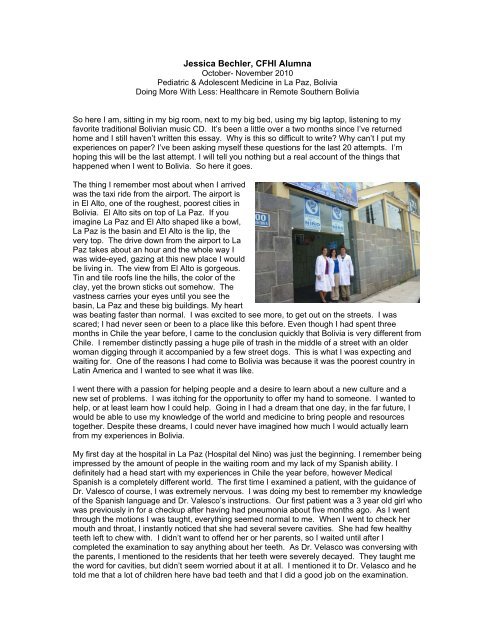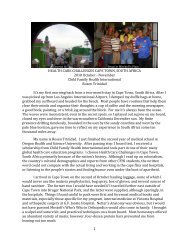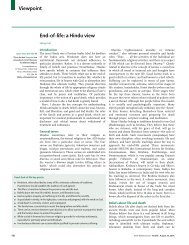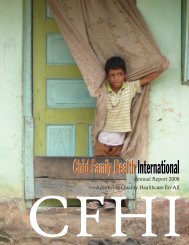Jessica Bechler, CFHI Alumna - Child Family Health International
Jessica Bechler, CFHI Alumna - Child Family Health International
Jessica Bechler, CFHI Alumna - Child Family Health International
You also want an ePaper? Increase the reach of your titles
YUMPU automatically turns print PDFs into web optimized ePapers that Google loves.
<strong>Jessica</strong> <strong>Bechler</strong>, <strong>CFHI</strong> <strong>Alumna</strong><br />
October- November 2010<br />
Pediatric & Adolescent Medicine in La Paz, Bolivia<br />
Doing More With Less: <strong>Health</strong>care in Remote Southern Bolivia<br />
So here I am, sitting in my big room, next to my big bed, using my big laptop, listening to my<br />
favorite traditional Bolivian music CD. It’s been a little over a two months since I’ve returned<br />
home and I still haven’t written this essay. Why is this so difficult to write? Why can’t I put my<br />
experiences on paper? I’ve been asking myself these questions for the last 20 attempts. I’m<br />
hoping this will be the last attempt. I will tell you nothing but a real account of the things that<br />
happened when I went to Bolivia. So here it goes.<br />
The thing I remember most about when I arrived<br />
was the taxi ride from the airport. The airport is<br />
in El Alto, one of the roughest, poorest cities in<br />
Bolivia. El Alto sits on top of La Paz. If you<br />
imagine La Paz and El Alto shaped like a bowl,<br />
La Paz is the basin and El Alto is the lip, the<br />
very top. The drive down from the airport to La<br />
Paz takes about an hour and the whole way I<br />
was wide-eyed, gazing at this new place I would<br />
be living in. The view from El Alto is gorgeous.<br />
Tin and tile roofs line the hills, the color of the<br />
clay, yet the brown sticks out somehow. The<br />
vastness carries your eyes until you see the<br />
basin, La Paz and these big buildings. My heart<br />
was beating faster than normal. I was excited to see more, to get out on the streets. I was<br />
scared; I had never seen or been to a place like this before. Even though I had spent three<br />
months in Chile the year before, I came to the conclusion quickly that Bolivia is very different from<br />
Chile. I remember distinctly passing a huge pile of trash in the middle of a street with an older<br />
woman digging through it accompanied by a few street dogs. This is what I was expecting and<br />
waiting for. One of the reasons I had come to Bolivia was because it was the poorest country in<br />
Latin America and I wanted to see what it was like.<br />
I went there with a passion for helping people and a desire to learn about a new culture and a<br />
new set of problems. I was itching for the opportunity to offer my hand to someone. I wanted to<br />
help, or at least learn how I could help. Going in I had a dream that one day, in the far future, I<br />
would be able to use my knowledge of the world and medicine to bring people and resources<br />
together. Despite these dreams, I could never have imagined how much I would actually learn<br />
from my experiences in Bolivia.<br />
My first day at the hospital in La Paz (Hospital del Nino) was just the beginning. I remember being<br />
impressed by the amount of people in the waiting room and my lack of my Spanish ability. I<br />
definitely had a head start with my experiences in Chile the year before, however Medical<br />
Spanish is a completely different world. The first time I examined a patient, with the guidance of<br />
Dr. Valesco of course, I was extremely nervous. I was doing my best to remember my knowledge<br />
of the Spanish language and Dr. Valesco’s instructions. Our first patient was a 3 year old girl who<br />
was previously in for a checkup after having had pneumonia about five months ago. As I went<br />
through the motions I was taught, everything seemed normal to me. When I went to check her<br />
mouth and throat, I instantly noticed that she had several severe cavities. She had few healthy<br />
teeth left to chew with. I didn’t want to offend her or her parents, so I waited until after I<br />
completed the examination to say anything about her teeth. As Dr. Velasco was conversing with<br />
the parents, I mentioned to the residents that her teeth were severely decayed. They taught me<br />
the word for cavities, but didn’t seem worried about it at all. I mentioned it to Dr. Velasco and he<br />
told me that a lot of children here have bad teeth and that I did a good job on the examination.
After that I noticed that about 90% of the children we examined had teeth similar to hers. This<br />
was the inspiration for the oral health project, which resulted in one of the best days I had in La<br />
Paz.<br />
I will never forget my week with Dr. Tajerina.<br />
She’s a fantastic, smiley, loving doctor who is<br />
extremely passionate about all her patients. As a<br />
pulmonologist who also specializes with Down<br />
syndrome patients, I was given the opportunity to<br />
see a variety of cases and how the most caring of<br />
doctors handle them. The first day I was with Dr.<br />
Tajerina a 6 month old baby with a severe case of<br />
Pneumonia needed a tube inserted into his chest<br />
cavity to drain the fluid. When the surgeon arrived,<br />
Dr. Tajerina drew me closer to watch as the<br />
surgeon pulled out a scalpel and made a clean<br />
incision between the ribs. I enjoyed watching the<br />
surgeon’s hands, the way he held his instruments and the surprising force he needed to insert the<br />
tube. I knew at that moment that with hard work and perseverance I would be able to learn an<br />
infinite amount of things during my time in Bolivia.<br />
This feeling carried me through the rest of my time, especially during the week I shadowed Dr.<br />
Galindo. Dr. Galindo was the same surgeon I had watched insert the chest tube and so I felt<br />
comfortable talking to him and watching him perform procedures. The best part about surgery<br />
week is that you get to see surgeries constantly. There are about 4 operating rooms in Hospital<br />
del Nino, and if Dr. Galindo isn’t using one of them he lets you watch others. In addition, there<br />
are windows in between each OR, which allows one to watch two surgeries at once. I became<br />
acquainted with the anesthesiologists working in each room and was invited over. I learned not<br />
to be afraid to talk to the surgeons and ask them questions. One day a surgeon asked me if I<br />
knew what the brown stuff was that he was using; I knew it was iodine and that they were using it<br />
as a disinfectant, but I didn’t know the word in Spanish, so I tried to sound it out “yyyodiiineee??”<br />
Before I could finish my failed attempt, he explained that if I didn’t know what something was I<br />
should ask. After that I did my best to communicate more.<br />
The one surgery I will never forget was on my second to last<br />
day. Dr. Galindo was the head surgeon that day which made<br />
me happy because he is one of the kindest surgeons I’ve ever<br />
met. The patient was a 19 day old baby with an extremely<br />
large cyst underneath the left side of his chin, completely<br />
covering his neck. I remember wondering how to say jugular<br />
vein in Spanish. Once everything was set up I noticed that the<br />
“beeping machine” wasn’t quite as rhythmic as usual. I<br />
guessed that maybe this baby had a heart arrhythmia like me.<br />
Then the scalpels and electrocauterers came out. They<br />
started out by taking off the layer of skin covering the cyst. It<br />
was incredible work.<br />
Dr. Velasco was an inspiration to me and I wanted to shadow<br />
him one last time before I left La Paz. The difference I could see in myself was tremendous. I<br />
realized how much more confident I was in both my medical and Spanish knowledge. I was<br />
actually able to understand almost everything that was happening, while being able to have<br />
interaction with the patients. Because I no longer had to give 100 % of my attention to Spanish, I<br />
could have nonverbal communication with the patients. All it ever took was a little eye contact<br />
with a warm smile. Dr. Velasco noticed this and said “Seras una buena pediatria <strong>Jessica</strong>”, which<br />
means “You will be a good pediatrician <strong>Jessica</strong>”. This was the best compliment I could have ever<br />
asked for.
The next day I was on a bus, ready to make a 20 hour journey to my next destination, Tarija. If<br />
you are going to Bolivia and taking a bus ride longer than 3-4 hours, bring a blanket, sweatshirt,<br />
hat, scarf, gloves, jacket, and wear layers. I traveled a lot while I was there and every bus ride I<br />
took was freezing cold at night. A lot of times the windows don’t work and if you plan on catching<br />
any sleep you are going to want something to keep you warm.<br />
I arrived in Tarija sweating and sleepy, but excited to start a new adventure. Tarija is at a much<br />
lower elevation than La Paz and so it’s a lot more tropical with a kind of humid heat. I loved it!<br />
The doctora that was in charge of the program picked me up at the bus station, gave me some<br />
instructions on how the week was going to go, and then brought me to my new host family.<br />
The host family that I had in La Paz was pretty small. My host “mom” was a 28 year old<br />
independent working woman. She was awesome and I enjoyed living with her, but I was excited<br />
to have more company in my homestay. When I arrived at my new home in Tarija, I wasn’t sure<br />
what to expect. I was nervous because I knew I was going to have siblings around my age and<br />
younger, an experience I’d never had before. My family in Tarija was more than I could have<br />
ever asked for. If it was not for their warm, loving ways I would not have seen Tarija for what it<br />
really is. Tarija is a small town with down to earth people who value family and time spent<br />
together more than anything. This is a sentiment I still carry with me.<br />
There were no other <strong>CFHI</strong> students in Tarija, so I<br />
spent most all my free time with my family. We<br />
would spend our time in the evenings drinking<br />
coffee, eating cheese or bread, and talking with<br />
friends and relatives. On the weekends we would<br />
take day trips together. Sometimes we would go<br />
and have lunch somewhere out on the town, while<br />
other days we would visit a family friend. It was<br />
hard not having any other students with me in the<br />
hospital and clinics, but I wouldn’t have traded it<br />
for the experience and time I got with my host<br />
family. They are truly my own family now. I have<br />
two little brothers and a younger sister with a Mom<br />
and a Dad who are truly great parents. I look<br />
forward to the day I will be able to see them again. Saying goodbye to them was the hardest<br />
goodbye of the trip.<br />
The medical experience in Tarija was also quite different than that in La Paz. The first week I<br />
went with the Chagas diagnosis team to different schools to test each child for Chagas. It was<br />
incredible because I was able to see their lab on the first day and then help them with the tests for<br />
the rest of the week. Working in a clinic type environment was an invaluable experience. There<br />
was a school full of children that needed to be tested every day and one by one we had to test<br />
each of them. Being able to help and participate was such a fulfilling experience.<br />
Another difference that I noticed right away was how time has a different meaning in Tarija. One<br />
morning we all arrived at 8 am, ready to head to the next school for the day. As we set out it was<br />
discussed how we were all tired and hungry still. So what did we do? We stopped and had<br />
breakfast and coffee on our way. I’m not talking about just grabbing a coffee and muffin from<br />
Starbucks. We actually went and sat down and ate breakfast and drank coffee, the driver of the<br />
car included. I was so pleasantly surprised! What a great way to start off the day I thought.<br />
The next week I followed a surgeon who was also more relaxed. He wasn’t an incredibly busy<br />
surgeon, I only saw him perform one surgery, and so every morning we had breakfast together. I<br />
actually learned a lot from him because he was very eager to explain anything I had questions<br />
about. I also gained experience in adult medicine. He was not a pediatrician so it was awesome
eing able to see a different side of medicine in Bolivia. He took me to the Chagas research<br />
facilities where I got to see all the “venchucas” they were working with. A “venchuca” is what they<br />
call the beetle that carries the Chagas parasite.<br />
In my last week, I went to a hospital in<br />
San Lorenzo where I got to see how<br />
country medicine and pediatrics<br />
intertwined. All the doctors there were<br />
amazing! They were so nice and eager to<br />
talk to me. I had the opportunity to<br />
shadow a dietician and a gynecologist.<br />
My last day there I saw a baby being born.<br />
It was fascinating! I was so happy I had<br />
chosen to go to Tarija because I would<br />
never have experienced such a thing<br />
otherwise.<br />
It’s March 25th and I have officially been<br />
back 3 months. I’m still sitting in my big<br />
room, with my big computer, playing my favorite Bolivian CD. I was supposed to have this essay<br />
done Jan 11 th , but I was in no shape to write about Bolivia in January. The last three months at<br />
home have come with a lot of hard adjustments. At first it was the little things: I kept trying to<br />
throw away my toilet paper and addressing strangers with “Hola”. I had a cell phone again. My<br />
friends could text me and I could text them back. Then it was the big things: I could see my<br />
friends and they all wanted to see me. Sometimes I forgot English and became tongue tied. I<br />
could drive my car again. I had to pay for gas. I had to pay for rent and worry about buying<br />
books for the next terms. I was no longer without company. I now lived with four roommates who<br />
spoke my language perfectly and knew my own culture better than I did. I went through many<br />
moments of frustration and anger with myself and the people around me. Nobody understood<br />
what I went through. Nobody knew what it was like to see a Bolivian child smile. Nobody knew<br />
about the love my Bolivian family gave me. Nobody knew me. Not anymore.<br />
Over time these thoughts and feelings lessened. Things felt less strange. My computer no<br />
longer felt big, my bed started fitting me better, and society seemed less selfish. I stopped<br />
throwing my toilet paper in the garbage and enjoyed every gulp of water from my oversized<br />
shower head. Now, I can write this essay.<br />
Don’t get me wrong, I still think about how a<br />
whole Bolivian family could live in my room<br />
alone. However, this is the life I was given.<br />
This is the country I belong to. It hurts to think<br />
of the faces of all the women, children, and<br />
families I’ve seen living on the streets. All I<br />
can do now is make sure I never forget those<br />
faces. Every day I think about my Bolivian<br />
family. I miss them terribly. Especially when I<br />
hear others speak Spanish. There is nothing<br />
as sweet as the voice of a native of Tarija<br />
speaking in their sing song sounds. I will go<br />
back someday. There is no way I will ever<br />
forget Bolivia.<br />
I look back at what I was expecting to get from this trip. I remember writing that I wanted to learn<br />
about foreign medicine, Spanish, and culture. I had no idea that I would end up learning just as<br />
much about myself as I would anything else. There is no such thing as growth without struggle.<br />
One day in Tarija I was particularly frustrated with Spanish. I had not spoken English to anything
more than a computer in over a month and my mind was on Spanish overload. This frustration<br />
led me to write a poem. The result is below:<br />
Some dias I am frustrada and confundida<br />
A lot of things here have sense but they never make sense<br />
I thought I would eat ice cream here, but instead I took it<br />
I also take yogurt, oranges, and drinks<br />
That's exactly right, I don't drink drinks, I take them<br />
I was planning on bringing some vino home with me<br />
but I found out here, I will be carrying it<br />
Kind of like how I never wear clothes<br />
I carry them<br />
Some days there is a lot of sun here<br />
and it makes heat<br />
but I can never be hot<br />
I can only have it<br />
Sort of like how I'll never do my homework,<br />
I'll only make it<br />
This might seem confusing, but I'm just getting started<br />
I can't even count the number of times I've reflexed myself<br />
It's funny, I used to tell people how I pleased myself<br />
liked myself<br />
and loved myself,<br />
I think I get it now<br />
There are two ways things happen(ed) in the past<br />
two ways things can be now<br />
two ways things are for<br />
and two ways I can know something<br />
I know the only way I know enough to write this poem<br />
is because I've come to know it<br />
So saying, this poem will only make sense<br />
if you have sense<br />
Otherwise, you've probably never tried to learn Spanish





